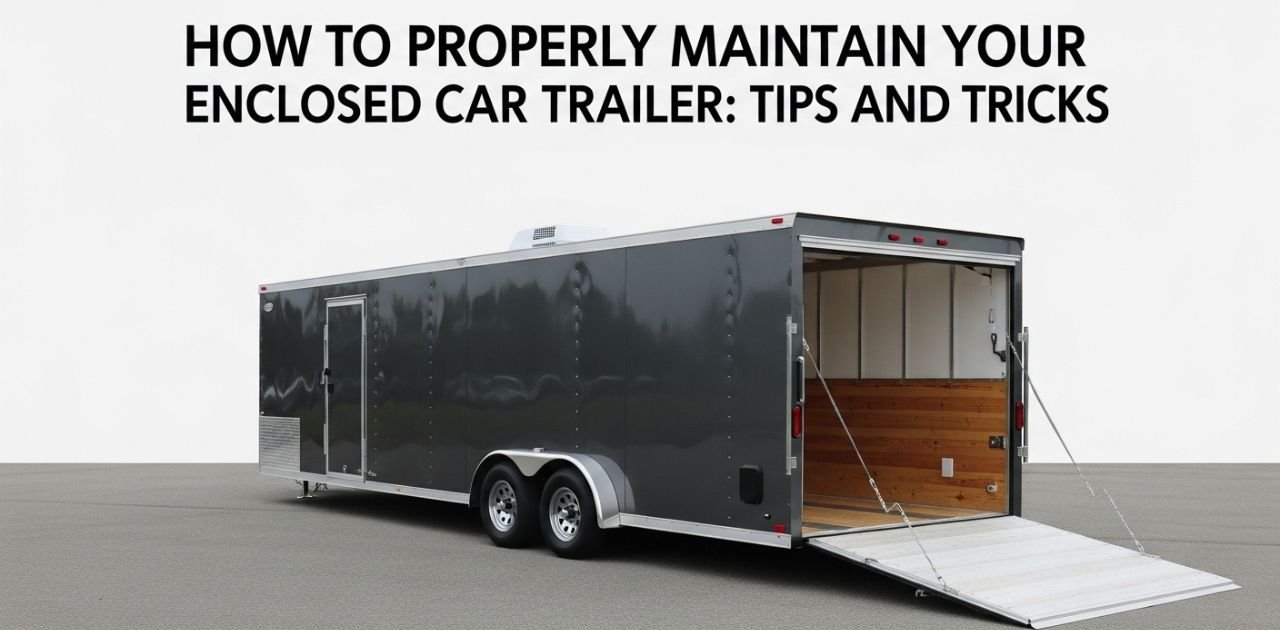Contents
- 1 Introduction to enclosed car trailers
- 2 The importance of regular maintenance
- 3 Daily and weekly checks for your trailer
- 4 Monthly and yearly maintenance tasks
- 5 Tips for keeping the exterior clean and rust-free
- 6 How to maintain the tires, brakes, and electrical systems
- 7 Troubleshooting common issues with enclosed car trailers
- 8 Conclusion: Why proper maintenance is crucial for your trailer’s longevity
- 9 FAQ
Introduction to enclosed car trailers
Enclosed car trailers are more than just vehicles; they’re essential companions for any motorsport enthusiast, collector, or hobbyist. Whether you’re transporting your precious race car to the track or securely storing a classic vehicle, keeping your trailer in top shape is crucial. These versatile transports protect your investment from the elements and provide peace of mind during long hauls.
But like any other equipment, enclosed car trailers require regular care and attention to perform at their best. Neglecting maintenance can lead to costly repairs and problems down the road. So, how do you ensure that your trailer stays in prime condition? Dive into this guide filled with practical tips and tricks designed to help you maintain your enclosed car trailer effectively. Let’s keep those wheels rolling smoothly!
The importance of regular maintenance
Regular maintenance is vital for the longevity of your enclosed car trailer. Just like any vehicle, neglect can lead to costly repairs down the line.
By staying proactive with upkeep, you ensure that every component functions optimally. This not only enhances safety but also protects your valuable cargo.
Routine checks help catch minor issues before they escalate into major problems. You’ll save time and stress by addressing small wear and tear early on.
Furthermore, a well-maintained trailer retains its value better than one that’s been overlooked. Keeping it in top shape means you’ll get more back if you decide to sell or trade it in later.
Regular maintenance fosters peace of mind. Knowing your equipment is reliable allows you to focus on what truly matters: enjoying your travels and adventures without worry.
Daily and weekly checks for your trailer
Daily checks are crucial for ensuring your enclosed car trailer is ready for the road. Before each trip, inspect the exterior and interior for any visible damage. Look closely at the lights to ensure they’re functioning properly.
Next, check that all doors and locks operate smoothly. A malfunctioning door can lead to serious issues while traveling.
Weekly inspections should focus on a few key areas. Start with tire pressure; under-inflated tires can cause blowouts.
Examine brake functionality as well, since responsive brakes are essential for safety during transport.
Verify that all straps and tie-downs are in good condition, avoiding potential accidents caused by loose cargo. Regular attention to these details will keep your trailer performing reliably over time.
Monthly and yearly maintenance tasks
Monthly maintenance tasks are essential for the health of your enclosed car trailer. Start by inspecting the interior for any signs of wear and tear. Check for loose fittings or damaged linings that could affect your cargo.
Don’t forget to lubricate hinges, latches, and ramps. This simple action can prevent rust and ensure smooth operation.
Yearly upkeep is even more critical. Take time to inspect the roofing for leaks or damage caused by weather elements. A thorough wash will help maintain its exterior integrity while preventing corrosion.
It’s also wise to check the wiring system annually. Look for frayed wires or loose connections that might compromise safety during travel.
Consider scheduling a professional inspection once a year to catch issues you might overlook—it’s an investment in your trailer’s longevity and performance on the road.
Tips for keeping the exterior clean and rust-free
Keeping the exterior of your enclosed car trailer clean is essential for preventing rust and maintaining its appearance. Start by washing it regularly with mild soap and water. Avoid harsh chemicals that could damage the finish.
Dry the surface thoroughly after washing to prevent water spots or streaks. Pay special attention to corners and crevices where dirt can accumulate.
Waxing your trailer at least twice a year creates a protective barrier against moisture and contaminants. A good-quality automotive wax not only adds shine but also helps repel dirt.
Inspect for scratches or dents frequently, as these areas can become prone to rust if left untreated. Touch up any imperfections promptly with matching paint.
It’s wise to park your trailer in shaded areas whenever possible, shielding it from UV rays that can degrade finishes over time. Investing in a quality cover will further safeguard against elements when it’s not in use.
How to maintain the tires, brakes, and electrical systems
Tires are your trailer’s connection to the road. Regularly inspect them for wear and tear. Check the tread depth, looking for uneven patterns that could indicate alignment issues. Maintain proper inflation levels; under-inflated tires can lead to blowouts.
Brakes are essential for safety. Inspect brake pads and rotors frequently for signs of wear. Listen for unusual noises when braking, as they can signal a problem needing immediate attention.
The electrical system powers lights and brakes, ensuring visibility on the road. Periodically check all connections and wiring for corrosion or damage. Test lights regularly to avoid surprises during night driving.
Don’t neglect these components; they contribute significantly to your trailer’s overall performance and safety on the road.
Troubleshooting common issues with enclosed car trailers
Enclosed car trailers can experience a variety of issues. Identifying the problem early can prevent bigger headaches down the road.
If you notice your trailer swaying while driving, check the load distribution. Uneven weight can lead to instability. Adjusting your cargo might do the trick.
Electrical problems are another common headache. If lights flicker or fail, inspect connections for corrosion and ensure fuses are intact. A simple cleaning or replacing a fuse often solves these annoyances.
Brakes that feel spongy should not be ignored. Inspect brake fluid levels and look for leaks in lines or cylinders. Addressing these promptly ensures safety on the road.
Keep an ear out for unusual noises during transit. Grinding sounds could indicate worn-out wheel bearings or brakes needing replacement—better safe than sorry!
Conclusion: Why proper maintenance is crucial for your trailer’s longevity
Proper maintenance is the backbone of any enclosed car trailer’s lifespan. Neglecting even small issues can lead to more significant problems, costing you time and money in repairs.
Regular checks ensure that every component performs optimally. This attention to detail helps prevent breakdowns on the road, keeping both your vehicle and cargo safe.
A well-maintained trailer retains its value over time. Potential buyers appreciate a history of care when considering their purchase.
Moreover, maintaining your trailer contributes to peace of mind during travel. Knowing that your equipment is in great shape allows you to focus on what really matters—your journey ahead.
Prioritizing maintenance means investing in countless adventures down the road. A little effort today pays off significantly tomorrow.
FAQ
What are some daily checks I should perform on my enclosed car trailer?
Daily checks include inspecting tire pressure, verifying proper hitch connections, and ensuring that lights are functioning correctly.
How often should I clean my enclosed car trailer?
It’s best to give your trailer a thorough cleaning after each use. However, seasonal deep cleanings help remove dirt and debris accumulated over time.
What routine maintenance tasks should I perform annually?
Annually inspect brakes, bearings, electrical systems, and check for any signs of rust or damage throughout the entire structure of the trailer.
How do I prevent rusting on my enclosed car trailer?
To prevent rusting, regularly wash your trailer’s exterior with soap and water. Apply wax periodically to create a protective barrier against moisture.
When should I replace tires on my transport vehicle?
Check tread depth regularly; if it’s worn down beyond 2/32 inches or if there are visible cracks or bulges in the sidewalls—it’s time for new tires regardless of age.




